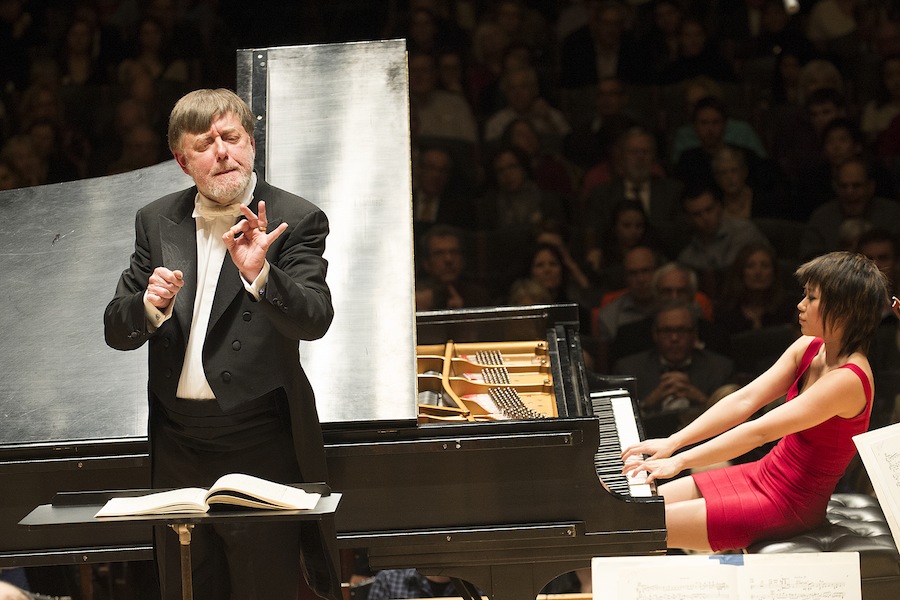BSO, Davis and Wang dazzle in piano and orchestral showpieces

Yuja Wang performed Prokofiev’s Piano Concerto No. 2 with conductor Sir Andrew Davis and the Boston Symphony Orchestra Thursday night at Symphony Hall. Photo: Stu Rosner
Looking at the Boston Symphony Orchestra onstage at Symphony Hall Thursday night, a thought came to mind: One million hours of practicing.
That’s a conservative estimate of what it took to get those 70 or so highly skilled musicians in a room, playing an exceptionally compelling performance of Ralph Vaughan Williams’s furious Symphony No. 6.
Such thoughts occurred often Thursday, as the concert led by Sir Andrew Davis became a celebration of virtuosity: collectively in the Vaughan Williams, and individually in brilliant performances by pianist Yuja Wang in Prokofiev’s Piano Concerto No. 2 and the BSO’s principal players in Rimsky-Korsakov’s orchestral showpiece Capriccio espagnol.
One knew something was up in the first three notes of the Vaughan Williams, bowed strongly by the strings in octaves. Stuttering brass answered, and the battle was joined. One could imagine how startled audiences were in 1948 to hear the kindly old composer of English pastoral scenes getting in touch with his inner Shostakovich.
Conducting without a baton and with big, embracing gestures, Davis nevertheless had the orchestra sharpened to a fine point as it drew out Vaughan Williams’s tricky rhythms and shadings of orchestral sound. It would be hard to imagine an orchestra sounding more “as one” than the BSO did in this controlled yet headlong performance.
The slow movement, with its bluesy modal melody for strings and dire brass summons, and the sarcastic scherzo, featuring the tenor saxophone and plenty of percussion, were vividly characterized. The soft, strangely affectless Epilogue, which had its first listeners reaching for metaphors such as “post-nuclear landscape,” dwindled slowly to a vanishing pianissimo, closing the symphony with an enigma.
There was, however, no mystery about the fact that one had heard this distinctive composer’s music authoritatively served by a conductor who knows it intimately.
Similarly, the concerto by the young, dynamic Prokofiev seemed made to order for the young, dynamic Chinese pianist Yuja Wang. (It was surely she, and not Vaughan Williams or Rimsky-Korsakov, who accounted for the fact that this night’s audience was noticeably younger and more Asian than on a typical Thursday at the BSO.)
In this piece, Wang’s tonal limitations—a stiff-wristed, splattered forte and mushy pianissimo—mattered less than her electrifying energy and astounding technique. Blazing scales, rapid leaps, rushes of staccato chords all yielded to her fierce attack.
There were rewards on the musical side as well, starting with the work’s opening theme, which Wang played with weight and authority. The big cadenzas of the first and last movements were not just brilliant athletically but broadly conceived. And the pianist brought out the witty accents in the scherzo’s rush of notes.
For their part, Davis and the orchestra made the most of Prokofiev’s bold gestures, lumbering like a bear in the march movement and emitting rude noises from the low brass in the finale.
But it was the diminutive volcano in a red dress on the piano bench that brought the audience to its feet Thursday night.
Then it was time to spread the virtuoso kudos around in Rimsky-Korsakov’s popular piece. In fact, Capriccio espagnol has apparently been too popular for this orchestra; after many performances under conductors such as Muck, Monteux, and Koussevitzky, the BSO virtually retired the piece in 1945. (A single performance under Erich Leinsdorf in 1968 was at a Pension Fund concert, an instance of the BSO first-chair virtuosos singing for their supper.)
Following the piece’s success at its 1887 premiere, the composer made the distinction between “a magnificently orchestrated piece” and “a brilliant composition for the orchestra”—i.e., a piece conceived with the individual instruments in mind from the first. He wrote that he used Spanish themes to create “multiform orchestral effects.”
Those effects were on display Thursday night, as were the superb skills of individual players in the orchestra. Associate concertmaster Tamara Smirnova executed the extensive violin solos with panache, and one will not soon forget the remarkably room-filling sound of Jessica Zhou’s harp.
The performance overall sounded neither quite settled-in—understandably for a piece that had spent nearly 70 years on the shelf—nor, despite the tambourine and castanets, particularly Spanish. Under Davis’s direction, it had something of the outdoorsy vigor and frankness of Vaughan Williams—sort of a “Capriccio anglais.”
No matter—the Thursday night subscribers were happy to rise at the end and toast their favorites in the orchestra, and the newcomers to Symphony Hall gladly followed suit.
The performance will be repeated 1:30 p.m. Friday and 8 p.m. Saturday. bso.org; 617-266-1200.
Posted in Performances



